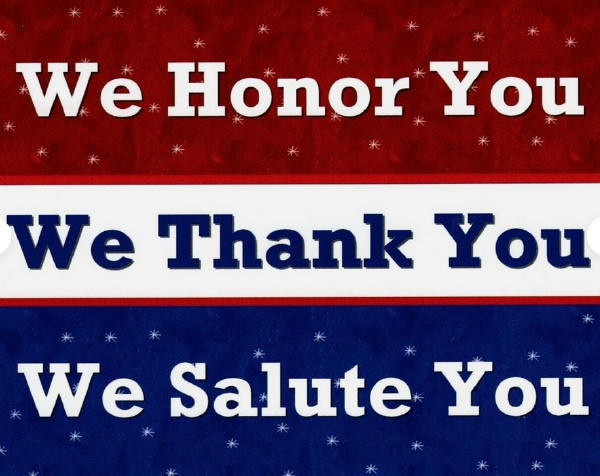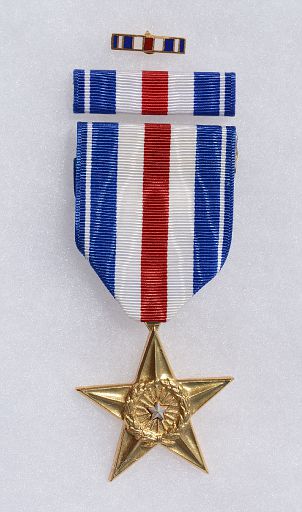SPC Brown displayed great courage in treating two wounded Soldiers while under intense small arms and mortar fire.
RAISED BY TWO MOMS
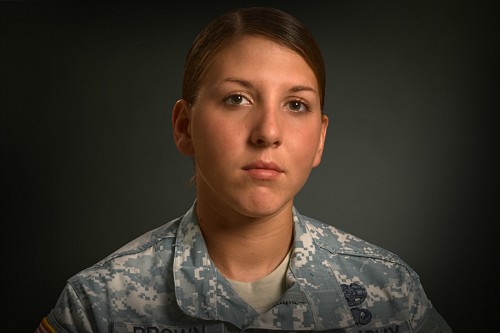 In 1991, when she was just three years old, Monica Brown's parents divorced, leaving her four-year-old brother, Justin, as the man of the house. Monica's mother worked night shifts as a nurse at local hospitals in Houston, Texas, and relied on her own mother to help with the kids. Life was never easy for the Browns, as they moved from town to town in search of a better nursing job. As a young girl, Monica was thinking ahead, dreaming of a secure future and a rewarding career. At times she wanted to be a lawyer, a veterinarian, even a paralegal, but she never thought she would work around heights or blood, her two biggest fears. In 1991, when she was just three years old, Monica Brown's parents divorced, leaving her four-year-old brother, Justin, as the man of the house. Monica's mother worked night shifts as a nurse at local hospitals in Houston, Texas, and relied on her own mother to help with the kids. Life was never easy for the Browns, as they moved from town to town in search of a better nursing job. As a young girl, Monica was thinking ahead, dreaming of a secure future and a rewarding career. At times she wanted to be a lawyer, a veterinarian, even a paralegal, but she never thought she would work around heights or blood, her two biggest fears.
By the time Monica was twelve, she had already attended seven different schools. Monica also had a new little brother, Kristofer, whom she adored and helped care for. After her mother was injured in a serious car accident, "Mema," as her grandmother was affectionately called, moved in with the family and took over raising the three kids.
Monica loved being outdoors and soon started running. She also jumped at the chance to go to the beach or camping with friends. While Monica loved playing outside, her older brother loved his GI Joes. By the time he was 13, Justin had decided he wanted to be in the United States Army. A few years later, he took his love for "playing Soldier" one step further when he became an avid player of the America's Army computer game. He learned about Army Values and the Warrior Ethos by which each Soldier abides. The more he learned, the more certain he became that the Army was right for him.
Kopperl High School, near Waco, Texas, was Monica's ninth school in eleven years. While she easily made friends at all her stops, Monica was closest to her brother Justin. The years of looking out for each other had cemented their bond and they had become best friends. Monica, a self-professed "girly girl," played tennis, volleyball and softball, and even found time to be a cheerleader. But running was her passion, and she ran cross-country and track for the Kopperl Eagles.
Running is like meditation for me. I can just think, without anyone talking to me.
While Justin was waiting for the day when he could become a Soldier, Monica decided to graduate from high school early in May of 2005. As the head of the X-ray and Sonogram department at a large hospital in the Houston area, an aunt had piqued Monica's interest in X-ray technology. To Monica, the job sounded rewarding-and bloodless. She had a plan: a career and stability. But throughout, Monica kept running. It had become part of her, and would ultimately serve her, and others, well.
JOINING WITH HER BROTHER
After high school, Monica and Justin moved to Lake Jackson, Texas living near their father's mother, "Mamaw." In the fall of 2005, Justin joined the Army. It was all he ever talked about. He had already met with local Recruiters and turned in the paperwork. One afternoon, Monica decided to accompany Justin to the recruiting office. She had no intention of joining the Army. But while Justin was talking to his Recruiter, another Recruiter approached Monica and struck up a conversation.
So, what are you planning on doing with your career?" he asked. And I was like, 'Well, I want to apply for an X-ray technician program but I'll have to wait another year.'
To Monica's surprise, the Recruiter said the Army could offer her a career as an X-ray technician. With an attractive signing bonus and the opportunity to see the world, Monica suddenly became interested. Sensing a potential Recruit, the Soldier checked further and, unfortunately, found that the program was full for the year. But there was an opening for a "Health Care Specialist," known more commonly in the Army as a "68 Whiskey," or medic.
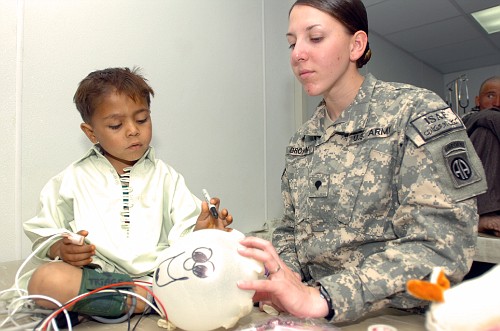 By the time she and Justin left the recruiting station that day, they had both enlisted, much to Monica's surprise. The Recruiters had been friendly and forthright and had told them both that chances were good that they would be deployed overseas to either Afghanistan or Iraq. But all Monica could think about as she chided Justin on their way home was why he had never told her about all the great benefits the Army offered. By the time she and Justin left the recruiting station that day, they had both enlisted, much to Monica's surprise. The Recruiters had been friendly and forthright and had told them both that chances were good that they would be deployed overseas to either Afghanistan or Iraq. But all Monica could think about as she chided Justin on their way home was why he had never told her about all the great benefits the Army offered.
I was so excited about the bonus money. But more importantly, I was going to go to college, and the Army was going to pay for it!
But they had to tell Mamaw.
When they arrived home that day they told their grandma to sit down. "Are you kids in some kind of trouble?" she asked. They explained what they had just done and, to their surprise, she told them she was proud they had made such an important decision on their own.
Both sets of our grandparents have always been so supportive and loving to us. I knew they were both very proud of Justin and me.
Young Monica Brown's next adventure was about to begin. Soon she would pack her running shoes and a photo of her two brothers and leave for Basic Training.
CONQUERING HER FEARS
As a female in the Army, Monica understood that she would always be measured against the men. On her first day of Basic Training at Fort Leonard Wood, Missouri, she was given two large duffel bags of standard issue uniforms and gear. 'I picked them up and I was like, 'Oh my God, am I going to be able to carry all of this stuff?' " She knew she could run, but this first simple yet daunting task raised doubts about how prepared she might be. She was terrified that she might topple under the weight of the duffels and be perceived by her fellow Soldiers as weak. But she managed to maneuver the bags to her barracks.
After Basic Training she went to Advanced Individual Training (AIT) at Fort Sam Houston in Texas, to begin the rigorous training to become a qualified medic. It was there that Monica met a drill sergeant whose impact would help define who she would become in the Army.
She was high-speed and airborne-qualified. Her independence and strong personality set her apart. I wanted to be high-speed like that. She was from the 82nd and had that maroon beret and the Airborne patch. I knew then that I wanted to be like her.
Though afraid of heights, Monica decided to go to Airborne school and learn how to jump from airplanes. Though squeamish around blood, she was fast becoming a well-qualified Army Health Care Specialist. At AIT, her squad leader and platoon sergeant were putting students through numerous training exercises to prepare them for everything they might encounter. From mass casualties to one-on-ones, they rehearsed battlefield scenarios until the new medics were qualified, confident, and prepared for any possibility.
As a Health Care Specialist you have to be prepared for being the only person out there as a primary care provider. You have to know how to handle casualties in a stressful environment.
Upon completion of medic training, Monica was assigned to the 82nd Airborne division at Fort Bragg, North Carolina. Soon after arriving, her unit prepared for deployment. Monica overcame her fear of heights quickly, learning how to jump from C130s, C-17s, Black Hawks, Chinooks, and just about any aircraft the Army flies. In addition, her squad ran at least 12 miles a week, which was fine with Monica. Running in body armor and completing long marches with heavy rucksacks was a different twist, but she persevered, and it got her into the best shape of her life.
CULTURE SHOCK
Regional Command (RC) East is the area of southeastern Afghanistan along the Pakistani border. For an 18-year-old woman from Texas, everything about RC East was a shock. When Monica arrived at Forward Operating Base (FOB) Salerno on February 7, 2007, she entered a world she had never imagined. FOB Salerno was one of the bigger operating bases in the country. At the time, all the medical facilities were in large tents: the operating theater, the CT machines, the barracks, everything. Since then, a modern medical facility has replaced the tent city.
From the moment of her arrival, the intensive medical training continued. Even on the front lines of the War on Terror, Monica and her squad practiced for every situation from sick call to treating emergency trauma patients. At first, she never left the base.
The first actual patient I worked on [overseas] was an Afghani man who had a gunshot wound to his leg. My reaction was, 'My Gosh, this is a real person and these are real injuries, this isn't training anymore.' That's when the switch flipped and I think everything changed over from training to me really liking my job.
Her first trips off-base were re-supply missions with Delta Troop, 4/73 Cavalry, and humanitarian missions in local villages where U.S. Army medical personnel would offer rudimentary health care to villagers at roadside clinics. Female health care workers were needed in these situations as local cultural norms did not allow males to examine female patients.
Monica e-mailed home regularly, describing what she saw. She told her grandparents and her mother about the children drawing water out of wells and washing clothes in the streams, about the primitive huts, the bare feet and the poverty. Never again would she take for granted electric lights, hot showers and food. She asked that her family pass her love to Justin, who was also in Afghanistan, as security regulations wouldn't allow them to communicate with each other in-theater. Their paths would soon cross, but not on the battlefield.
C-TROOP
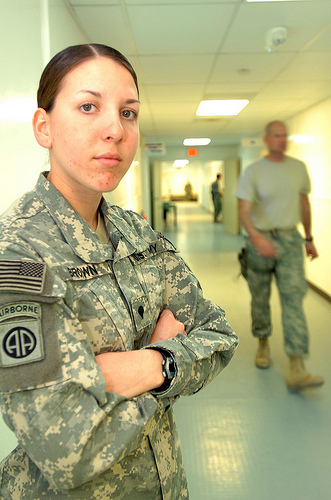 Near the end of April 2007, Monica was attached to Charlie Troop, 4/73 Cavalry, when that unit's medic went on leave. Monica enjoyed working with new Soldiers and trying new things. Charlie Troop received orders to go on a Search and Capture mission. The patrol consisted of four up-armored HMMWVs and one Afghan National Army (ANA) pickup truck. As a rule, one U.S. Army medic is needed to cover 26 Soldiers. Private Brown and Charlie Troop would be away from the FOB for five nights. She would be sleeping on the ground under the stars, like one of the guys. Near the end of April 2007, Monica was attached to Charlie Troop, 4/73 Cavalry, when that unit's medic went on leave. Monica enjoyed working with new Soldiers and trying new things. Charlie Troop received orders to go on a Search and Capture mission. The patrol consisted of four up-armored HMMWVs and one Afghan National Army (ANA) pickup truck. As a rule, one U.S. Army medic is needed to cover 26 Soldiers. Private Brown and Charlie Troop would be away from the FOB for five nights. She would be sleeping on the ground under the stars, like one of the guys.
APRIL 25, 2007
Charlie Troop awoke the morning of April 25, 2007, outside a small village. Intelligence had informed them that two Taliban activists lived in the village. There were also possible weapons caches nearby. Charlie Troop had a mission plan. They would search for weapons, make the Taliban arrests, and return to the ANA compound at Khar Kot Castle by nightfall.
After a search of a dry well yielded nothing, the patrol entered the village. The streets were eerily empty. A search of the Taliban suspects' homes revealed the two men had been warned and had slipped away. The Soldiers of Charlie Troop saddled up, eager to return to base.
By that time it was getting late in the day and it was kind of hazy. We tried to drive in the riverbeds and fields instead of taking the roads, because the enemy was planting a lot of mines on the routes we were taking.
The convoy rolled out of the village. One by one, the HMMWVs veered into a riverbed adjacent to the road. Private Brown, the platoon medic, looked out her window at the mountains in the distance.
Though she did not hear the explosion, Private Brown did hear her gunner yell, "Two One's hit! Two One's hit!" Shouting down from his .50 cal turret, he continued, "I only see smoke and a tire rolling through the field!" The trailing HMMWV, with five Soldiers inside, had rolled over a pressure plate IED (Improvised Explosive Device) as it veered off the road and into the riverbed. It exploded into flames and was stuck on the high ground of the riverbank. Immediately, the driver of Brown's HMMWV stopped the vehicle. Private Brown instinctively grabbed her aid bag and her weapon and opened the door. But the gunner yelled down again, "Shut the door!" as the unmistakable ping of incoming machine gun fire signaled the start of an ambush.
With the door safely shut and the aid bag by her side, Private Brown could hear the incoming rounds ricochet off the vehicle as the gunner's legs wheeled around in the turret above.
"Let's go, Doc!" yelled her Platoon Sergeant, as he jumped out of the HMMWV.
This time, Private Brown opened the armored door and stepped out into a hail of enemy fire. She pulled her aid bag-overstuffed and weighing nearly fifty pounds-onto her shoulders and grabbed her weapon. And she ran.
RUNNING AGAIN
Private Monica Brown was running through the heavy silt of the riverbed, rounds whizzing past her ears. The Platoon Sergeant was a few steps ahead. They ran about 300 meters back to where black smoke and flames were billowing into the quiet sky.
I thought about every guy in that truck. Are they okay? I need to get to them now. I was the medic. It was my job to help them. I guess all of that stuff rushed into my brain and my muscles took over and I ran.
When Brown reached the slope of the riverbed, the men were crawling out of the burning vehicle. She dropped to her knees, exhausted. Two of the men appeared seriously wounded and were lying on their sides. The other vehicles of the convoy were turning around to form a crescent formation and began to return fire. Brown made a quick assessment of the wounded. "Okay, this one's my critical, this one's next." But as the incoming fire intensified on their position, she determined the group had to move to cover if she was going to treat the wounded.
We started hearing these louder pops. The doors of the burning HMMWV were wide open and the Mark-19 rounds and the mortar rounds inside started cooking off and going every which direction. Now our own truck was shooting at us!
Private Brown and the men reacted quickly. Dragging the two wounded Soldiers by the handles of their body armor, they took cover in the low ground of the riverbed. But the enemy soon trained mortar fire on Brown's location. Over the next few minutes, as many as 15 mortar rounds exploded within a few feet of Brown and her vulnerable casualties.
All I heard was the whistle and I knew exactly what it was. I yelled, 'Incoming!'
'I WILL NEVER LEAVE A FALLEN COMRADE'
Her preparation and training paid off as she dived over one of the wounded men with her body while yelling to another Soldier to "cover up" the other casualty. The pounding was relentless. Soon the Platoon Sergeant returned with the Afghan National Army (ANA) vehicle close at hand. They would have to drag the wounded men again through the firefight to get them to the vehicle, and then out of harm's way. The crescent formation of the three remaining HMMWVs was pouring heavy suppressive fire over the battlefield. Brown and the men made a run for the vehicle. With bullets still flying from several enemy positions, Brown and the Platoon Sergeant succeeded in lifting the men into the back of the pickup. Brown then jumped headfirst into the back as the truck sped away. Holding one man by the hand while applying pressure to the other man's head wound, she continually reassured them that they were all going to get out of there alive.
"I KNEW WHAT TO DO"
The ANA truck sped across the riverbed and out of the line of fire, eventually stopping behind one of the HMMWVs. It was here Brown set up her working CCP, or Casualty Collection Point. Above her, the gunner on the .50 cal was rocking away, laying down covering fire on the remaining enemy positions. The Soldier with the head injury was bleeding heavily and slipping in and out of consciousness. The other Soldier had extensive burns on his legs, chest and back. Brown covered the man's burns with gauze and then put him in a hypothermia prevention bag. She soon had the men stabilized and prepped for medevac.
WOMEN MAKING HISTORY
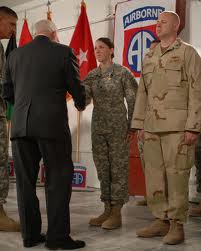 For her extraordinary bravery and complete disregard for her own safety, Private Monica Brown was awarded the Silver Star by Vice President Dick Cheney at a ceremony in Afghanistan. Her brother Justin was flown in for the occasion from his post in another part of the country. Monica is only the second female since World War II to receive such an honor. Because of the courage and skill of Brown and the other Soldiers of Charlie Troop, the two men wounded that day were delivered from the battlefield and survived their injuries. But what Monica Brown remembers most from that day is not the gunfire or the explosions: For her extraordinary bravery and complete disregard for her own safety, Private Monica Brown was awarded the Silver Star by Vice President Dick Cheney at a ceremony in Afghanistan. Her brother Justin was flown in for the occasion from his post in another part of the country. Monica is only the second female since World War II to receive such an honor. Because of the courage and skill of Brown and the other Soldiers of Charlie Troop, the two men wounded that day were delivered from the battlefield and survived their injuries. But what Monica Brown remembers most from that day is not the gunfire or the explosions:
When the medevac bird was taking off and everything was quiet, my ears were still ringing. I couldn't hear anything. I was walking through the field back to the HMMWVs, through shin-high green grass, blowing because the bird was taking off. I remember thinking, 'Did that just really happen? Did I do everything right?' When I got back to the trucks the guys were all hugging me and thanking me.
No longer afraid of heights or uneasy around blood, Sergeant Monica Brown today attends the University of North Carolina at Pembroke, pursuing a nursing degree, paid for by the Army's ROTC program. When she leaves school after four years she will be a commissioned officer in the U.S. Army.
Sergeant Brown's personal experience underscores the evolving history of women in the Army. Women began serving in the military as nurses in World War II. And today, they are still making history around the world. They are driving trucks, patrolling the streets as military police, and are attached to Infantry and line units. They are heroes in the face of their fears. And, like Monica Brown, they are accomplishing great deeds as Soldiers.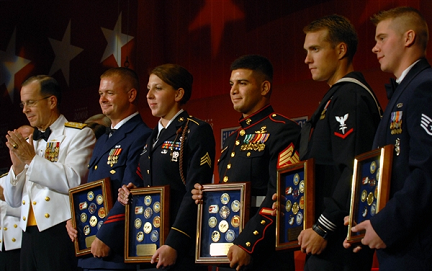
|

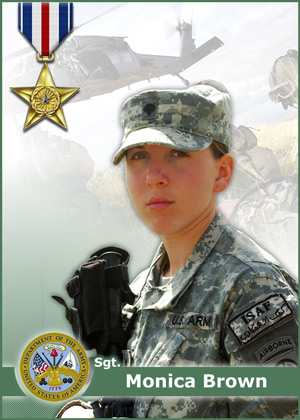

![]()



















